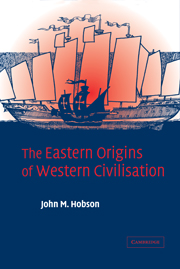Book contents
- Frontmatter
- Contents
- List of tables
- Preface and acknowledgements
- Map: Hobo-Dyer projection of the world
- 1 Countering the Eurocentric myth of the pristine West: discovering the oriental West
- I The East as an early developer: the East discovers and leads the world through oriental globalisation, 500–1800
- II The West was last: oriental globalisation and the invention of Christendom, 500–1498
- III The West as a late developer and the advantages of backwardness: oriental globalisation and the reconstruction of Western Europe as the advanced West, 1492–1850
- 8 The myth of 1492 and the impossibility of America: the Afro-Asian contribution to the catch up of the West, 1492–c. 1700
- 9 The Chinese origins of British industrialisation: Britain as a derivative late developer, 1700–1846
- 10 Constructing European racist identity and the invention of the world, 1700–1850: the imperial civilising mission as a moral vocation
- 11 The dark side of British industrialisation and the myth of laissez-faire: war, racist imperialism and the Afro-Asian origins of industrialisation
- IV Conclusion: the oriental West versus the Eurocentric myth of the West
- Notes
- Index
8 - The myth of 1492 and the impossibility of America: the Afro-Asian contribution to the catch up of the West, 1492–c. 1700
Published online by Cambridge University Press: 22 September 2009
- Frontmatter
- Contents
- List of tables
- Preface and acknowledgements
- Map: Hobo-Dyer projection of the world
- 1 Countering the Eurocentric myth of the pristine West: discovering the oriental West
- I The East as an early developer: the East discovers and leads the world through oriental globalisation, 500–1800
- II The West was last: oriental globalisation and the invention of Christendom, 500–1498
- III The West as a late developer and the advantages of backwardness: oriental globalisation and the reconstruction of Western Europe as the advanced West, 1492–1850
- 8 The myth of 1492 and the impossibility of America: the Afro-Asian contribution to the catch up of the West, 1492–c. 1700
- 9 The Chinese origins of British industrialisation: Britain as a derivative late developer, 1700–1846
- 10 Constructing European racist identity and the invention of the world, 1700–1850: the imperial civilising mission as a moral vocation
- 11 The dark side of British industrialisation and the myth of laissez-faire: war, racist imperialism and the Afro-Asian origins of industrialisation
- IV Conclusion: the oriental West versus the Eurocentric myth of the West
- Notes
- Index
Summary
It is well to observe the force and virtue and consequences of discoveries. These are to be nowhere seen more conspicuously than in printing, gunpowder, and the magnet [compass]. For these three have changed the whole face and state of things throughout the world.
Francis Bacon, 1620‘The great age of European expansion’ was no outpouring of pent-up [rational] dynamism. It was launched from the insecure edges of a contracting civilization … Fifteenth-century Europe will appear to [distant future historians], if they notice at all, as stagnant and introspective … [Its] economy as a whole still suffered a permanently adverse trading balance with Islam and could not guarantee to feed its own population.
Felipe Fernández-Armesto[N]o equality was possible or desirable for the ‘darkies’. In line with this conviction … Catholic and Protestant, at first damned the heathen blacks with the ‘curse of Canaan’, then held out hope of freedom through ‘conversion’, and finally acquiesced in a … status of human slavery.
W. E. B. Du BoisOne of the key years in the Eurocentric chronology of world history is 1492. It is taken as axiomatic that the discovery of the world would fall to the Europeans. For by then only they had developed what Max Weber called a ‘rational restlessness’ and ‘ethic of world mastery’ that enabled modern development on the one hand and the conquest of the world on the other. And the most familiar sign of this was Columbus's ‘discovery’ of America.
- Type
- Chapter
- Information
- The Eastern Origins of Western Civilisation , pp. 161 - 189Publisher: Cambridge University PressPrint publication year: 2004



